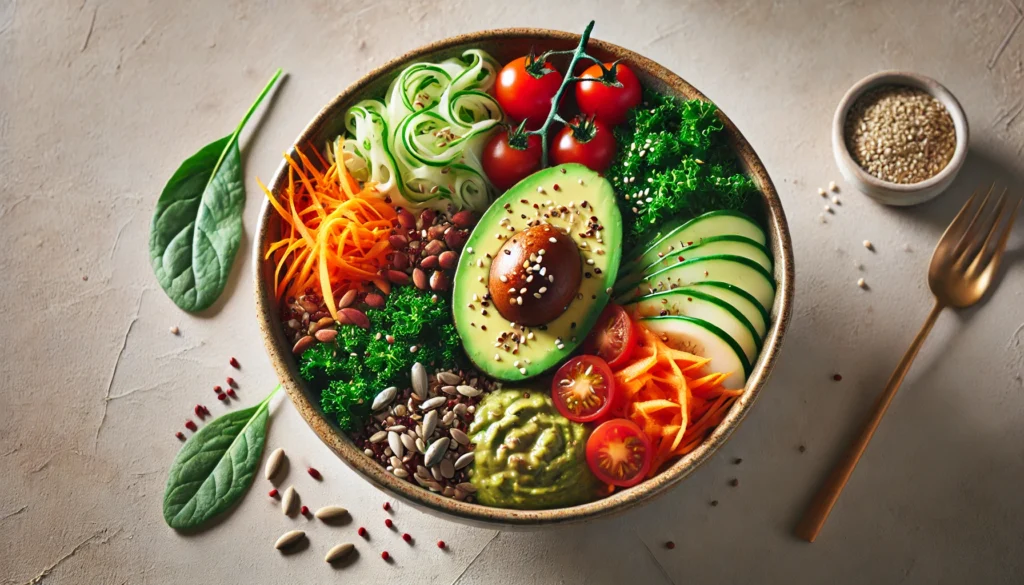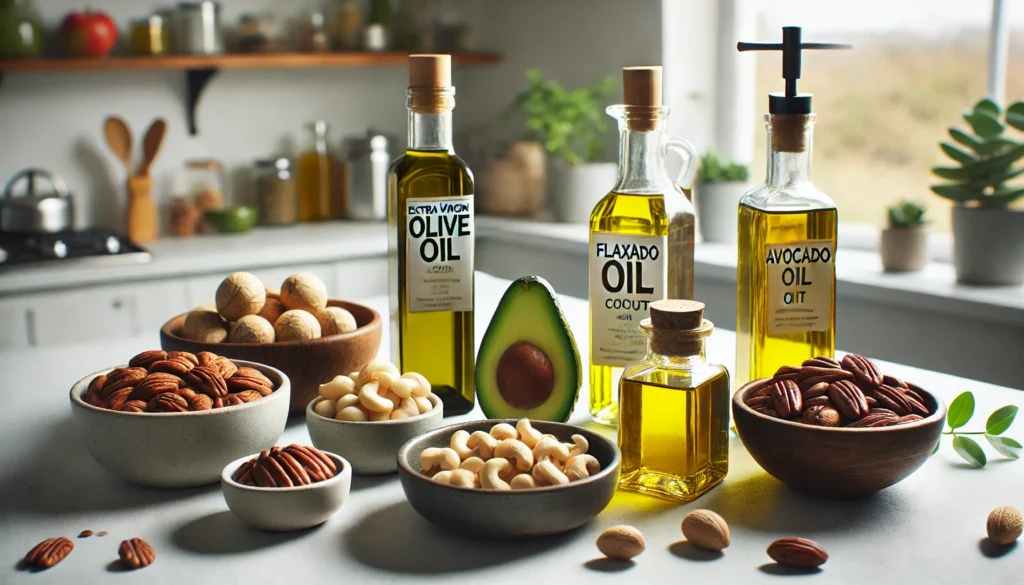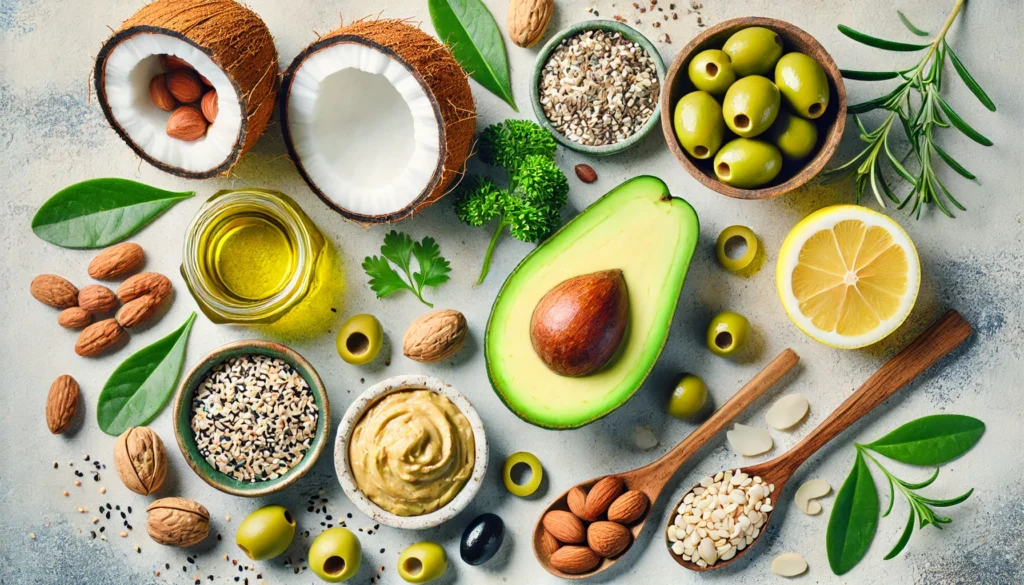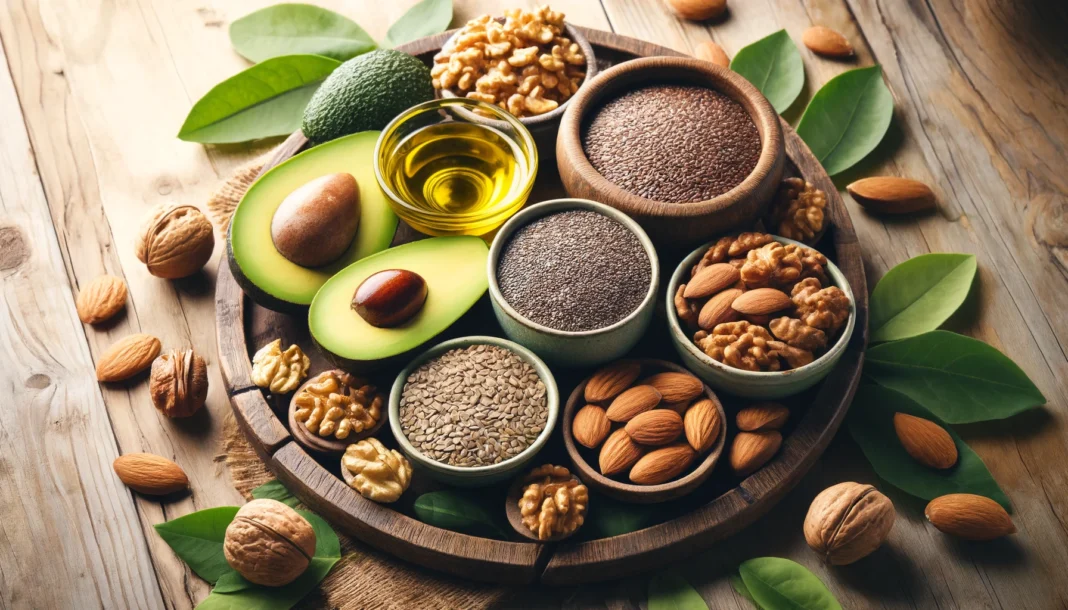For many people transitioning to a vegan or vegetarian lifestyle, dietary fat often becomes an overlooked or misunderstood component of nutrition. The cultural narrative around fat, historically demonized for its association with weight gain and chronic disease, still lingers in public perception. However, science has shifted this paradigm. Today, we understand that not all fats are created equal, and in fact, certain fats—especially those derived from plants—are critical to optimal health. In the context of a whole-food plant-based lifestyle, healthy vegan fats serve as essential building blocks for hormonal balance, cognitive function, nutrient absorption, and sustained energy. Dispelling the myth that plant-based diets are inherently low-fat or lacking in essential fatty acids, this article explores the profound role of fat on a vegan diet and highlights the best plant-based fat sources for energy, wellness, and long-term health.
You may also like: Best Plant-Based Carbs for Energy and Health: What Science Says About Vegetarian Carbohydrates
Understanding the Importance of Fat in a Plant-Based Diet
Before diving into specific food sources, it’s essential to first understand why fat plays such an indispensable role in human health. Fat is one of the three primary macronutrients, alongside protein and carbohydrates, and it serves multiple physiological purposes. These include cell membrane integrity, absorption of fat-soluble vitamins (A, D, E, and K), insulation and protection of vital organs, and the production of key hormones such as estrogen and testosterone. On a cellular level, fat supports the myelin sheath that encases nerves, contributing to efficient neural communication and brain health.
In the context of a whole-food, plant-based diet, healthy vegan fats are particularly valuable because they often come bundled with antioxidants, polyphenols, and fiber—not the saturated fats and cholesterol found in animal-based products. This synergistic nutritional profile makes plant-based fats uniquely suited to promote cardiovascular health, reduce inflammation, and support metabolic function. Despite misconceptions, the inclusion of high fat vegan foods does not necessarily lead to weight gain. In fact, when consumed mindfully and in appropriate portions, these foods can support satiety and help regulate appetite.
The question “Is vegan food fattening?” arises frequently, especially among individuals concerned with weight management. The answer is nuanced. Vegan food, like any food, can be fattening if consumed in excessive amounts or in highly processed forms. However, whole, nutrient-dense sources of fat—such as avocados, nuts, seeds, and olives—tend to support a feeling of fullness that can actually prevent overeating. Moreover, many high fat foods for vegans are also rich in protein and fiber, which further enhances satiety and stabilizes blood sugar levels.

Debunking the Myths Around Fat and Weight Gain
The stigma around dietary fat as a contributor to obesity was largely driven by flawed studies and oversimplified health campaigns in the latter half of the 20th century. These campaigns often failed to distinguish between different types of fats—lumping trans fats, saturated fats, monounsaturated fats, and polyunsaturated fats into one undifferentiated category. As a result, even healthy fats were vilified, and low-fat products flooded the market, many of them high in added sugars and refined carbohydrates that ultimately worsened metabolic outcomes.
Contemporary nutrition science now emphasizes the importance of fat quality over fat quantity. Healthy fats on a vegan diet, especially those rich in omega-3 and omega-6 fatty acids, play a vital role in reducing systemic inflammation, improving heart health, and enhancing cognitive function. When comparing vegan fat sources to animal fats, the absence of dietary cholesterol and lower levels of saturated fat make plant-based fats a superior choice for many people, especially those with cardiovascular concerns.
Understanding the distinction between different types of fats is crucial for anyone adopting a plant-based lifestyle. Monounsaturated fats, found abundantly in foods like avocados and olives, have been shown to lower LDL cholesterol levels and maintain HDL cholesterol. Polyunsaturated fats, including essential omega-3s and omega-6s, are found in flaxseeds, chia seeds, walnuts, and hemp seeds. These fatty acids cannot be synthesized by the body and must be obtained through diet. Both categories are considered healthy fats for a vegan diet, and their inclusion should be deliberate and well-balanced.
The Nutritional Power of Avocados in a Vegan Diet
Avocados stand out as one of the most nutrient-rich and versatile high fat vegan foods. They are a concentrated source of monounsaturated fats, particularly oleic acid, which has been associated with reduced inflammation and improved heart health. Beyond fat content, avocados offer fiber, potassium, magnesium, and a suite of B-vitamins that support energy metabolism and nervous system function. The creamy texture of avocados makes them a natural substitute for dairy-based spreads and condiments, offering a satisfying mouthfeel without the drawbacks of saturated animal fats.
In addition to their nutritional content, avocados contribute significantly to the absorption of fat-soluble vitamins when eaten alongside other plant-based foods. For instance, adding avocado slices to a salad increases the bioavailability of carotenoids found in leafy greens, such as lutein and beta-carotene, which are crucial for eye health and immune function. As a staple in many cultures, avocados provide not only flavor and richness but also serve as a strategic way to enhance nutrient density in meals without relying on processed oils.
The broader implications of incorporating avocados into a plant-based diet include improvements in metabolic health, appetite regulation, and cardiovascular markers. Research has shown that individuals who regularly consume avocados tend to have higher intakes of fiber, vitamins E and K, and unsaturated fats—nutrients often highlighted in discussions around healthy fats in a vegan diet. Whether mashed into toast, blended into smoothies, or sliced atop grain bowls, avocados are a versatile ally in building a satisfying and nutrient-complete plant-based plate.

Frequently Asked Questions: Healthy Vegan Fats and Plant-Based Fat Sources
1. Can high fat vegan foods be part of a weight loss plan?
Yes, high fat vegan foods can absolutely support a weight loss journey when incorporated strategically. Foods like avocado, nuts, seeds, and olives are calorically dense, but they also offer high satiety, meaning they help you feel full longer. This can lead to reduced overall calorie intake throughout the day. Furthermore, these foods are rich in healthy vegan fats, which support stable blood sugar levels and reduce cravings for refined carbohydrates. The key is portion control and pairing plant based fats with fiber- and protein-rich whole foods to maintain a balanced, nutrient-dense diet that encourages sustainable weight loss.
2. How do healthy fats on a vegan diet impact hormone health?
Fat on a vegan diet plays a crucial role in hormonal function, particularly for reproductive and thyroid health. Healthy fats vegan diet advocates often point to omega-3 rich seeds like flax and chia, which help regulate inflammatory pathways and support hormonal balance. Without sufficient fat intake, the body may struggle to produce key sex hormones like estrogen and progesterone. Including a variety of vegan fat sources ensures you get the full spectrum of essential fatty acids, which act as building blocks for hormone synthesis. Inadequate fat intake, especially among those consuming extremely low-fat vegan diets, can disrupt menstrual cycles and overall hormonal stability.
3. Are plant based fats more heart-healthy than animal fats?
Research consistently shows that plant based fats, especially those from whole foods, are linked to better cardiovascular outcomes compared to animal fats. Unlike animal fats, which often contain cholesterol and high levels of saturated fats, vegetarian fats are primarily unsaturated and come bundled with antioxidants and fiber. This combination helps reduce LDL cholesterol and inflammation, both key factors in heart disease. For example, replacing butter with almond butter or olive oil provides heart-protective benefits without compromising flavor or texture. Regular consumption of healthy vegetarian fats has been associated with improved endothelial function and reduced risk of atherosclerosis.
4. What are some underrated vegan fat sources that people often overlook?
While avocados and nuts get most of the spotlight, there are several underrated vegan fat sources worth exploring. Tahini, made from ground sesame seeds, offers a unique flavor and a rich profile of calcium, iron, and healthy vegan fats. Coconut butter, used in moderation, provides medium-chain triglycerides that may support energy metabolism. Additionally, sprouted pumpkin seeds are rich in zinc and vegetarian good fats, making them ideal for immunity and skin health. Incorporating lesser-known high fat foods for vegans helps diversify the nutrient intake and makes meals more exciting. These options can also appeal to those with allergies to more common fat sources like peanuts or tree nuts.
5. How can athletes benefit from high fat foods for vegans?
Athletes following a plant-based lifestyle can benefit from incorporating high fat vegan foods as part of their recovery and performance strategies. Healthy fats contribute to joint lubrication, support sustained energy during endurance activities, and aid in muscle repair through anti-inflammatory effects. Vegan fat sources like hemp seeds and walnuts are particularly beneficial due to their omega-3 content, which reduces exercise-induced inflammation. Furthermore, pairing plant based fats with protein-rich legumes or tofu enhances nutrient absorption, especially fat-soluble vitamins like vitamin D, crucial for bone health. For endurance athletes, including healthy fats vegetarian diet staples like nut butters in pre-workout meals can help prolong energy availability.
6. What are practical ways to include more healthy vegetarian fats without overdoing calories?
One effective strategy is to use healthy vegetarian fats as flavor enhancers rather than the base of a dish. A drizzle of flaxseed oil over roasted vegetables, a tablespoon of tahini in salad dressing, or a small handful of seeds on oatmeal adds richness without overwhelming calorie counts. It’s also helpful to focus on whole-food vegetarian fat sources instead of processed oils, which are more calorie-dense and less nutrient-rich. Spacing fat intake throughout the day—such as incorporating some in breakfast, lunch, and dinner—can help with satiety and hormonal balance without promoting weight gain. Awareness of portion sizes, especially when consuming high fat vegan foods like nut butters, is key to maintaining calorie balance.
7. Is vegan food fattening compared to omnivorous diets?
The idea that vegan food is inherently fattening is a misconception rooted in outdated nutritional thinking. While certain high fat foods for vegans can contribute to weight gain if consumed excessively, they are generally more nutrient-dense and less inflammatory than many animal-based fats. Healthy fats on a vegan diet come from sources like nuts, seeds, and avocados, which are metabolically supportive and unlikely to promote fat storage when eaten in moderation. Vegan diets also tend to include more fiber, which slows digestion and improves satiety. Compared to omnivorous diets that rely heavily on processed meats and dairy, well-planned vegan diets rich in healthy vegan fats offer a more balanced and sustainable approach to weight management.
8. How do healthy fats support cognitive performance in a vegan diet?
Cognitive health relies heavily on adequate intake of essential fatty acids, many of which are abundant in vegan fat sources. DHA and EPA, two critical omega-3s, are not found in significant amounts in most plant-based foods but can be obtained from algae-based supplements—an excellent option for vegans. Beyond supplementation, alpha-linolenic acid (ALA), found in flax, chia, and walnuts, serves as a precursor and can partially convert to DHA and EPA in the body. Regular consumption of healthy vegetarian fats improves membrane fluidity in brain cells, enhances neurotransmitter signaling, and may reduce cognitive decline with age. Emerging research even suggests that diverse sources of fat for vegans may influence mood, focus, and memory retention.
9. Are there any emerging innovations in plant based fats?
Yes, the food industry has begun innovating around plant based fats in exciting ways. Advances in fermentation technology are producing more sustainable and bioavailable vegan fat sources, such as precision-fermented dairy-free butters. These alternatives aim to mimic the mouthfeel of animal fats without their health drawbacks. Additionally, oil seeds like camelina and sacha inchi are being cultivated for their high omega-3 content, expanding the landscape of vegetarian fat sources. The push toward regenerative agriculture is also influencing the way we grow nuts and seeds, ensuring that future sources of fat for vegans are both nutritious and environmentally sustainable. This wave of innovation is transforming how we think about and utilize healthy fats vegan diet options.
10. How can someone balance omega-3 and omega-6 fats in a vegetarian diet?
Balancing omega-3 and omega-6 fatty acids is crucial for controlling inflammation and promoting long-term health. While many vegetarian fat sources like sunflower and corn oil are high in omega-6, it’s important to consciously include omega-3-rich options to maintain balance. Prioritizing flaxseeds, chia seeds, walnuts, and hemp seeds can help tip the ratio toward a more anti-inflammatory profile. Supplementing with algae-based DHA may also be beneficial, especially for those at risk of neurological or cardiovascular issues. Achieving the right balance of healthy fats vegetarian diet staples means not just increasing omega-3s, but also moderating excessive omega-6 intake from processed vegan snacks and refined oils.

Nuts and Seeds: The Cornerstones of Plant-Based Fat Intake
Nuts and seeds represent some of the most concentrated sources of vegetarian fats available, offering a diverse array of textures, flavors, and nutrient profiles. Almonds, walnuts, cashews, pistachios, flaxseeds, chia seeds, sunflower seeds, and hemp seeds are just a few examples of nutrient-dense vegan fat sources. Each variety brings its own unique combination of essential fatty acids, vitamins, minerals, and phytochemicals that contribute to overall health.
Walnuts, for example, are particularly rich in alpha-linolenic acid (ALA), a plant-based omega-3 fatty acid associated with anti-inflammatory benefits and cardiovascular protection. Chia and flaxseeds are similarly high in ALA and also provide soluble fiber, which supports digestive health and blood sugar regulation. These seeds are especially valuable for individuals looking to optimize their intake of healthy fats on a vegan diet without over-relying on processed oils.
One of the notable features of nuts and seeds is their versatility. They can be incorporated into meals in countless ways, from topping smoothie bowls and salads to being blended into creamy sauces or ground into butters. These vegetarian good fats not only contribute to flavor and texture but also play a vital role in satiety, helping to prevent excessive snacking and support weight management goals. Contrary to outdated assumptions, the moderate consumption of nuts and seeds has been linked to lower body mass index (BMI) and reduced risk of chronic disease.
While calorically dense, these foods provide a nutrient-rich return on investment. Unlike empty calories from processed snacks, the calories from nuts and seeds come packed with fiber, protein, and micronutrients. For anyone concerned about sources of fat for vegans that align with whole-food principles, nuts and seeds are indispensable. Their role in supporting brain health, hormone production, and long-term wellness makes them a foundational component of any plant-based eating pattern.
Further Reading:
Top 10 Plant-Based Sources of Healthy Fat
9 Healthy Vegan Fats To Add To Your Plant-Based Plates
plant-based lifestyle, vegan health benefits, vegetarian nutrition, whole food meals, clean eating habits, plant protein sources, meat-free diet, flexitarian tips, sustainable eating, nutrient-dense foods, healthy food choices, longevity diet, diet and disease prevention, animal-free nutrition, health-conscious eating, plant-based meal planning, diet transitions, nutrition science, heart-healthy foods, eco-friendly diet
The information contained in this article is provided for general informational purposes only and is not intended to serve as medical, legal, or professional advice. While NewsHealthWatch strives to present accurate, up-to-date, and reliable content, no warranty or guarantee, expressed or implied, is made regarding the completeness, accuracy, or adequacy of the information provided. Readers are strongly advised to seek the guidance of a qualified healthcare provider or other relevant professionals before acting on any information contained in this article. NewsHealthWatch, its authors, editors, and contributors expressly disclaim any liability for any damages, losses, or consequences arising directly or indirectly from the use, interpretation, or reliance on any information presented herein. The views and opinions expressed in this article are those of the author(s) and do not necessarily reflect the official policies or positions of NewsHealthWatch.

